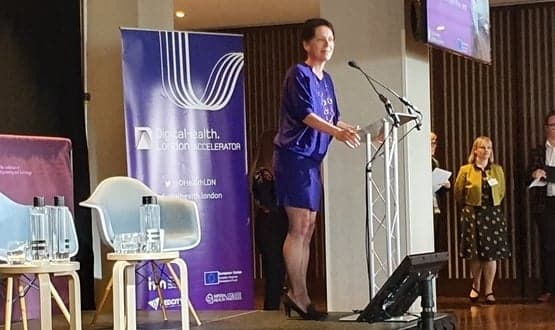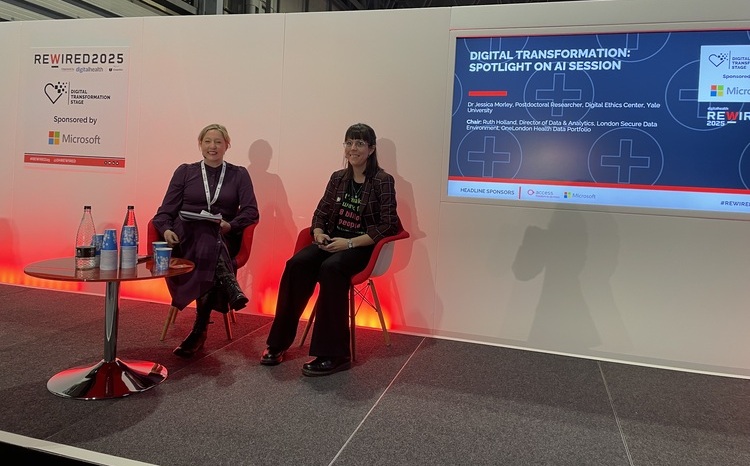Twenty companies inducted into DigitalHealth.London accelerator programme
- 10 September 2019

Twenty health tech companies have become the fourth cohort to be inducted into DigitalHealth.London’s accelerator programme.
The innovations address several challenges faced by the NHS including workflow management; access to services; decision support; self-management; workforce issues; and support for diseases like cardiovascular disease and cancer.
The companies will gain access to in-depth knowledge of the NHS through the accelerator programme and be given the opportunity to work collaboratively with clinicians and those working within digital health to expand their product within the health service.
In her keynote address at the launch in London on 9 September, Tara Donelley, chief digital officer at NHSX, said the accelerator programme was part of a bigger picture of digital health “going mainstream”.
“The number of innovations in healthcare can feel absolutely overwhelming, particularly to people with a busy day job,” she said.
“By putting companies through a rigorous process it enables us to recommend you and curate the offers out there to a number that people can get their heads around.
“That really helps those who are commissioning know about the candidates to scale. Today is a terrific celebratory moment. We applaud the success of the last cohort and welcome in the next.
“But to those who have got on, I say: Yes, be excited, phone your mum, have a glass of champagne, but don’t think that because you’re on the programme it is going to be easy. You will have to do a great deal of work.”
She encouraged NHS peers in the room to take on just one company in the fourth cohort and try to expand it within their organisation.
Other keynotes of the day reminded those inducted into the fourth cohort of the programme not to get carried away with the solution without properly understanding the problem.
Liz O’Riordan, a consultant breast surgeon and breast cancer patient, spoke of how her time as a patient changed gave her a new perspective on digital health support tools.
“Quality of care is three things, it’s clinical effectiveness, it’s safety and it’s the patient experience,” she said.
“It’s that last one that I now know is the most important, but it’s the hardest to measure. You can’t quantify the patient experience, there’s no financial incentive for improving the patient experience because you can’t quantify it, and patients are all different.”
Liz O'Riordan, Consultant Breast Surgeon and patient gives us the real talk – "I hate change." But I live my life through technology, "I love the data." Apps and technology can help us cope with illness, as well as wellness #healthtech #digitalhealth @Liz_ORiordan #DHLAccelerator pic.twitter.com/VSnIoWXhGb
— DigitalHealth.London (@DHealthLDN) September 9, 2019
She warned that for an innovation to be successful patients first need to understand how the digital solution works and how their data will be used.
“A lot of patients think that all this digital health care is solving problems we don’t have and they’re in it to make a quick buck,” she said.
“That comes back to data sharing. If I put data in an app who does it belong to? Does it belong to me or does it belong to you? What are you using it for?
“A lot of people think you’re making money by selling their data on. These are real concerns that patients have and we need to explain it to them to bring them on board.”
O’Riordan suggested one way health tech companies could do that was having a patient on their board, or a member of the public advising them as their company grows.
“If you’ve never had my illness you don’t know what I need, you don’t know what I want. It is all about the patients, because every single one of us will be a patient ourselves one day,” she added.
Sara Nelson, programme director at the DigitalHealth.London Accelerator, said: “I feel really proud of the accelerator and its achievements over the last three years. Today is another step forward and represents how both sides – innovators and the NHS – are coming together more and more to solve the very real challenges NHS organisations face every day.
“Digital technologies are not only creating new opportunities to change things for patients, they are also creating new opportunities to make things better for staff, and the wider system.”
[themify_box icon=”info” color=”gray”]
The full list of healthtech companies in the fourth cohort
- Ampersand Health: a digital therapeutic for people with long-term inflammatory conditions
- Birdie: A solution using digital tools in the home to deliver preventative care for an ageing population
- Diabetes Digital Media: provides personalised apps to improve the health of patients with Type 2 diabetes, including the NHS Low Carb Programme
- Edge Health: A digital rostering solution that allows NHS organisations to make better use of their data
- EQL Limited: a digital physiotherapy solution providing an AI-triage tool
- Ibex Medical Analytics: a tool that applies AI to cancer to reduce diagnostic error rates
- LifeBox Health: a tool that digitises patient assessments for surgery
- Lifelight: allows any smartphone or tablet camera to measure blood pressure, pulse and breathing rates
- Macusoft: provides personalised treatment plans for people with macular degeneration
- Medicspot Limited: building a network of remote GPs via video link
- Motilent: specialises in the assessment of digestive diseases using medical image analysis
- Ortus-iHealth: a virtual outpatient clinic using an app and web-based portal to combine appointments, video consultations and remote monitoring
- Oxford Heartbeat: technology that helps clinicians plan and rehearse stent placements inside blood vessels
- Patchwork: connects organisations to a growing number of workers to reduce reliance on agency staff
- Push Doctor: an online consultation platform for GP surgeries
- SkinVision: drives early detection of skin cancer using a smartphone camera and machine learning
- Sweatcoin: incentives physical activity through an app that tracks steps and turns them into a reward point for products, goods and services
- Tiny Medical Apps (Digital Health Passport): an NHS Login enabled personal health record app to help patients manage long-term conditions
- Vine Health: combines behavioural science and AI to improve the quality of life and survival rates of patients with cancer
- White Swan: a registered charity that accelerates the path to diagnoses for patients with difficult symptoms using data science
[/themify_box]





